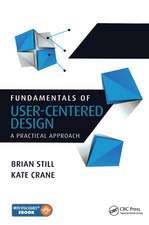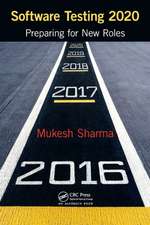Modeling and Simulation of Everyday Things
Autor Michael Rothen Limba Engleză Hardback – 23 mar 2018
Build the necessary skillsets with operating systems, editing, languages, commands, and visualization.
Obtain hands-on examples from sports, accidents, and disease to problems of heat transfer, fluid flow, waves, and groundwater flow.
Includes discussion of parallel computing and graphics processing units.
This introductory, practical guide is suitable for students at any level up to professionals looking to use modeling and simulation to help solve basic to more advanced problems.
Michael W. Roth, PhD, serves as Dean of the School of STEM and Business at Hawkeye Community College in Waterloo, Iowa. He was most recently Chair for three years at Northern Kentucky University's Department of Physics, Geology and Engineering Technology, and holds several awards for teaching excellence.
| Toate formatele și edițiile | Preț | Express |
|---|---|---|
| Paperback (1) | 395.45 lei 6-8 săpt. | |
| CRC Press – 19 mar 2018 | 395.45 lei 6-8 săpt. | |
| Hardback (1) | 1009.92 lei 6-8 săpt. | |
| CRC Press – 23 mar 2018 | 1009.92 lei 6-8 săpt. |
Preț: 1009.92 lei
Preț vechi: 1468.40 lei
-31% Nou
Puncte Express: 1515
Preț estimativ în valută:
193.27€ • 201.03$ • 159.56£
193.27€ • 201.03$ • 159.56£
Carte tipărită la comandă
Livrare economică 14-28 aprilie
Preluare comenzi: 021 569.72.76
Specificații
ISBN-13: 9781138485440
ISBN-10: 1138485446
Pagini: 368
Ilustrații: 71
Dimensiuni: 191 x 235 x 32 mm
Greutate: 0.86 kg
Ediția:1
Editura: CRC Press
Colecția CRC Press
ISBN-10: 1138485446
Pagini: 368
Ilustrații: 71
Dimensiuni: 191 x 235 x 32 mm
Greutate: 0.86 kg
Ediția:1
Editura: CRC Press
Colecția CRC Press
Public țintă
Academic and Professional Practice & DevelopmentCuprins
Preface
Author
Section I Getting Your Feet on the Ground
1. Building Your Basic Tool Box
2. Getting to Know the Neighborhood
3. Visualizing Your Work and Representing Your Best Story
Section II Models of Everyday Things
4. Things We See in the News: The Fun and the Dangerous
5. The Many Faces of Music
6. Going with the Flow
Section III Beyond Everyday Phenomena
7. One of the Most Versatile Simulation Tools Around
8. Simulations that Explore Atoms and Planets
Section IV A Glimpse into More Advanced Computing
9. Parallel Computing, Scripting and GPU’s
Appendix A: Integrated C++ / Python Simulation of Guitar Sounds
Index
Author
Section I Getting Your Feet on the Ground
1. Building Your Basic Tool Box
2. Getting to Know the Neighborhood
3. Visualizing Your Work and Representing Your Best Story
Section II Models of Everyday Things
4. Things We See in the News: The Fun and the Dangerous
5. The Many Faces of Music
6. Going with the Flow
Section III Beyond Everyday Phenomena
7. One of the Most Versatile Simulation Tools Around
8. Simulations that Explore Atoms and Planets
Section IV A Glimpse into More Advanced Computing
9. Parallel Computing, Scripting and GPU’s
Appendix A: Integrated C++ / Python Simulation of Guitar Sounds
Index
Notă biografică
Michael W. Roth, PhD, serves as Dean of the School of STEM and Business at Hawkeye Community College in Waterloo, Iowa. Prior to that he has held faculty positions at a variety of community colleges and universities in Colorado, New Mexico, Texas, Iowa and was most recently Chair for three years at Northern Kentucky University's Department of Physics, Geology and Engineering Technology. He has a passion for teaching and holds several awards for teaching excellence across all levels of undergraduate study, and has participated in course and program development and assessment. He has involved a large and diverse group of students in his computational physics modeling and simulation–based research program, and has published numerous articles and presented at conferences with them in the fields of condensed matter surface physics, bullet impact, groundwater flow, snow remediation, solar system formation, and planetary impact. He is a collector of antique science books and laboratory equipment.
Recenzii
"Mike Roth refers in his book to the dispersed pieces of information that everyone gains via internet in everyday life and completes them with professional knowledge on computer modeling, providing an introduction to the techniques of computer simulations, showing their usefulness as well as their limits. His lively narrative style makes his book accessible for everyone interested in science."
— Prof Lucyna Firlej, Laboratoire Charles Coulomb, Montpellier, France
"a playful and exciting introduction to a complex subject of continuous and discrete-event modeling and simulation. With a multitude of real-word examples and hands-on experiences, the book is very accessible to students."
—Prof. Masha Sosonkina, Old Dominion University
— Prof Lucyna Firlej, Laboratoire Charles Coulomb, Montpellier, France
"a playful and exciting introduction to a complex subject of continuous and discrete-event modeling and simulation. With a multitude of real-word examples and hands-on experiences, the book is very accessible to students."
—Prof. Masha Sosonkina, Old Dominion University
Descriere
This easy-to-follow introductory guide is written to teach basic modeling and visualization without assuming any background in programming or physics. It includes a general introduction to tools, platforms and a coding language, followed by focused chapters dealing with examples from physical systems encountered in everyday life, as well as applications in more advanced systems.






